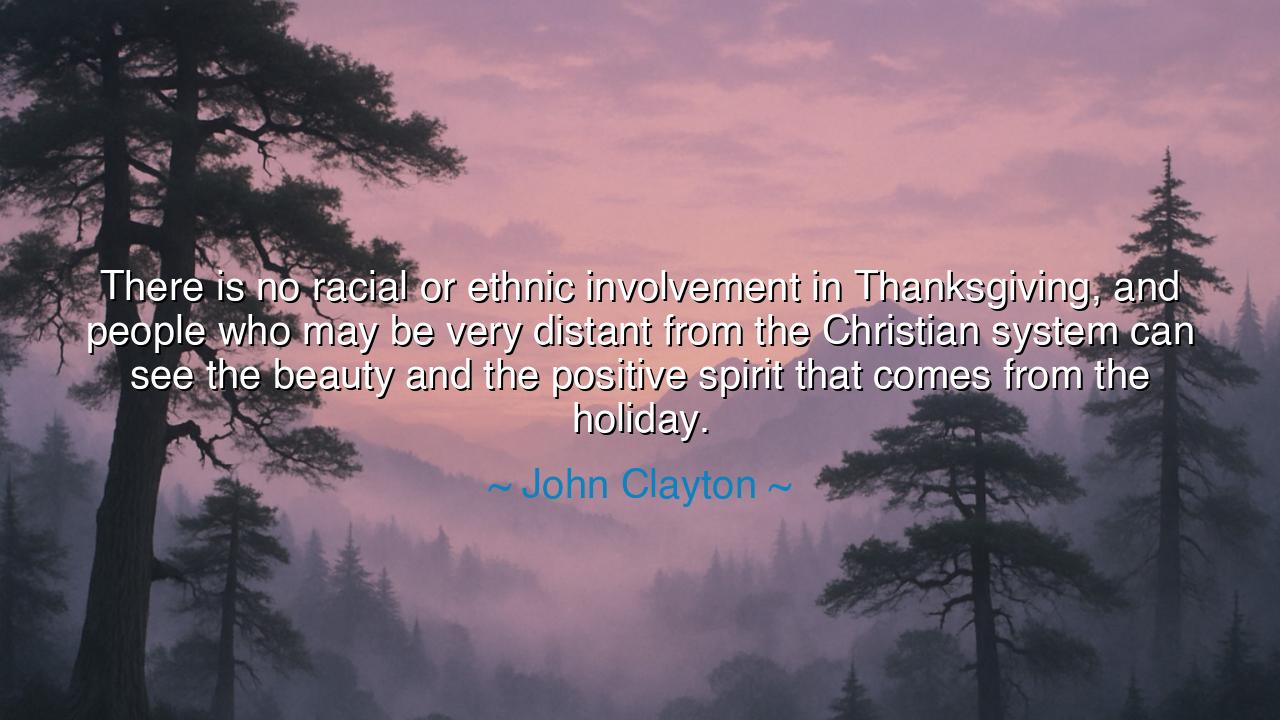
There is no racial or ethnic involvement in Thanksgiving, and
There is no racial or ethnic involvement in Thanksgiving, and people who may be very distant from the Christian system can see the beauty and the positive spirit that comes from the holiday.






Hear, O seekers of truth, the words of John Clayton, who spoke with clarity of spirit: “There is no racial or ethnic involvement in Thanksgiving, and people who may be very distant from the Christian system can see the beauty and the positive spirit that comes from the holiday.” These words, though simple in their clothing, are rich in meaning, for they speak of a day that transcends the boundaries that so often divide humankind. They proclaim that the heart of Thanksgiving is not bound by tribe, creed, or nation, but shines as a light that all may share.
Consider the wisdom here: in a world scarred by division, men have ever sought signs of unity, feasts that all can partake in without fear or exclusion. Many holy days belong to particular faiths, tied by sacred cords to their traditions. Yet Thanksgiving—though born in the soil of America, though nurtured by a Christian heritage—is not confined to any one people. It is not bound by racial or ethnic claim. It is a feast of gratitude, and gratitude is the common language of all souls. In this lies its beauty: it is a table at which all may sit.
Let us remember a story from the year 1942, when in the midst of the second World War, soldiers from many nations gathered around simple meals on the battlefront. American troops, weary and far from home, shared their Thanksgiving rations with allied comrades—British, Canadian, even those from lands with no history of the holiday. There, in the mud of war, Thanksgiving was stripped of all national garments and stood bare as a feast of the heart: a moment of fellowship, a reminder of home, and a whisper of peace in the midst of strife. That day, no one asked what god his brother prayed to, nor what race or lineage he bore. Gratitude alone was the bond.
Clayton’s words remind us that the positive spirit of the feast can reach even those “distant from the Christian system.” For though its roots may draw from prayers of Pilgrims and hymns of the faithful, its fruit is universal. Who among the nations does not understand the sweetness of giving thanks? Who among the tribes of the earth does not see beauty in families gathering, in strangers sharing bread, in a people pausing to remember the gifts of life? Gratitude is older than creed, deeper than law, and wider than custom. It is the breath of the soul when it beholds blessing.
Yet mark this well, children of tomorrow: the true danger is to forget the universality of the feast, to turn it into pride of nation or weapon of exclusion. For then its spirit is broken, and what was meant for unity becomes another banner of division. But when lived rightly, Thanksgiving becomes a bridge—between faiths, between peoples, between the past and the present. It is not the property of any one group, but a gift to all who would embrace it.
The lesson, then, is clear: let your gratitude be free of barriers. Do not ask who may or may not give thanks with you. Instead, open the circle wider. Invite the stranger, welcome the neighbor, cherish the family, honor the foreigner. For the power of gratitude is multiplied when shared, and the table grows richer when many hands bring their portion.
Practical action flows from this truth: in your own Thanksgiving, do not make the guest list small. Invite those who differ from you, that unity may be strengthened. Speak aloud your thanks, not only for what you hold, but for the people who share the journey with you. Teach the young that gratitude belongs to all, and that joy is not diminished by sharing but enlarged. Let your feast become a song of beauty that even those “distant from the Christian system” may hear and rejoice in.
Thus remember: the greatness of Thanksgiving is not in turkey nor in tradition alone, but in its power to draw together what the world would scatter. It is a light not owned, but offered. Go forth, then, and be keepers of that light—living each day with gratitude unbound, with thanksgiving unchained, with hearts that see beauty in all. For in doing so, you honor the spirit that Clayton saw: a feast of all humanity, a psalm of unity sung across the earth.






AAdministratorAdministrator
Welcome, honored guests. Please leave a comment, we will respond soon